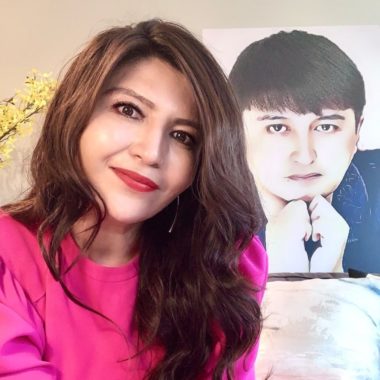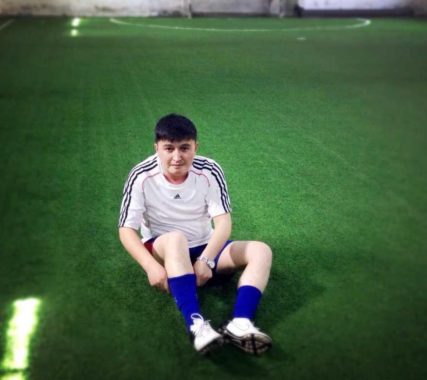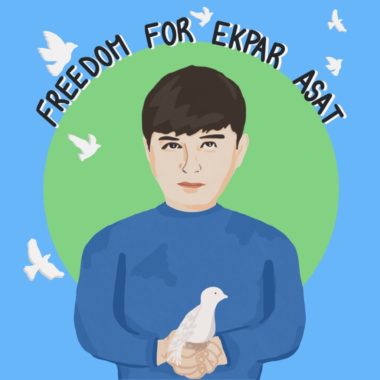HLS Advocates for Human Rights is proud to present the Spotlight Series, a forum for essays and opinion pieces written by Harvard Law School students and alumni calling attention to pressing domestic and international human rights issues. If you are a Harvard Law student or alumnus/a and would like to contribute a piece to Spotlights, please contact Sondra Anton ([email protected]) or Ikram Ais ([email protected]).
The views and opinions expressed in Spotlight pieces are those of the authors or interviewees and do not necessarily reflect the official policy or position of HLS Advocates for Human Rights, the International Human Rights Clinic, or the Human Rights Program at Harvard Law School.
On March 9, 2020, HLS Advocates for Human Rights hosted “Surveilled, Detained, Disappeared: Repression in Xinjiang,” a panel discussion on the oppression of Uyghur and other Turkic and Muslim minority groups in the Xinjiang region. At the event, Rayhan Asat (LLM ‘16), the first Harvard Law School graduate of Uyghur origin, shared publicly for the first time that her brother, Ekpar Asat, had been forcibly disappeared after returning to China from a U.S. State Department-sponsored trip to Washington, D.C as part of the International Visiting Leaders Program (IVLP).
Rayhan was in the final weeks of her LLM program at HLS when Ekpar came to the United States to participate in the IVLP. Ekpar visited her during this trip and promised her that he’d be back in a few months’ time to attend her graduation ceremony with their parents. Unfortunately, that was the last time that Rayhan saw her brother. Her parents canceled their trip to the U.S., and she never heard from Ekpar again. Nearly four years later, Rayhan learned that her brother had been sentenced by the Chinese government to fifteen years in prison for “inciting ethnic hatred and ethnic discrimination,” despite Ekpar’s track record of “continuous effort in cultivating ethnic harmony, and greater understanding between the Han and other ethnic groups in Xinjiang Province of China.”
The decision to come forward with Ekpar’s story was not easy for Rayhan, who was cognizant of the possibility of retribution. However, as an attorney and as a sister, Rayhan felt compelled to speak truth to power and pursue justice for her brother and the Uyghur community.
Since then, Rayhan has dedicated her time and energy to securing the release of Ekpar, who she describes as “a wonderful brother” and “a very bright person with a massive heart.”
Rayhan recently spoke with HLS Advocates Co-President Jamie Magcale JD ’21 about Ekpar’s case and her year of advocating for her brother’s freedom.
Jamie Magcale: Rayhan, it has been one year since you came back to Harvard Law School and spoke publicly, for the first time, about your brother’s disappearance. Can you walk us through what the decision to come forward with Ekpar’s story was like for you?
RA: Sharing my brother Ekpar Asat’s ordeal was the most important and daunting decision I’ve ever made in my life. If I didn’t do it, no one could, so I had no choice but to find real moral courage within myself. Speaking truth to power is never easy, but I was especially terrified to speak out against and draw the attention of the world’s most powerful authoritarian government—a government that still threatens people I love. The fear I felt as I began to do this was deep, real, and painful, but I withstood it as I began to strategize privately, thinking of ways I could free my brother from the outside. This ordeal has shaped me and endowed me with a necessary resilience. Though it was terrifying to imagine, I considered what I would want if I were in my brother’s place. The answer was straightforward: I would want him to speak out for me and ask that the world stand for what is right.
This answer was simple, but the task ahead of me was not. I would work to free my brother even though I faced imminent and permanent risk, drawing guidance from those in the past who had been forced into similar challenges. When I came across the story of Allan Gerson, a Jewish lawyer who fought to bring justice for victims of concentration camps, I felt my own purpose resonating across history. It hardened my resolve to confront my own brother’s plight as an attorney, and to serve as proof—like Gerson did—that it is possible to win out against your fears and right the wrongs suffered by your loved ones. I am my brother’s keeper, so my only option was to choose hope over fear.
JM: What did it mean for you to begin your advocacy at your alma mater?
RA: We all have our own struggles. A few of us, though, have struggles that can only be overcome if we are able to gain the support of others. As a lawyer and someone seen as a problem-solver, it was very difficult to be vulnerable and rely on outreach rather than directly taking up my brother’s case with an organ of justice. When I imagined sharing my vulnerability with the public, I hoped that the rawness of my wounds would cause people to offer their support. Luckily, this hope came true as I had my professor, William Alford, and the wonderful alumni community come to my side. This has been especially important since I’ve been able to show how my life has turned out after graduation and compare it to that of my fellow alumni who are not faced with freeing their family from illegal imprisonment.
Both I, as a Harvard Law student, and my brother, as a member of the State Department’s prestigious International Visitors Leadership Program, had exceptionally bright futures. But his enforced disappearance changed everything for both of us. When we met up during his time in the US, he promised to bring my parents to watch me become the first Uyghur graduate of Harvard Law School. But this hope disappeared with him into the shadows of the internment camps as soon as he returned to China. At my graduation, his seat remained empty. Harvard remains a very special place for me, but I have a new connection to it now that it’s also where my life took a turn for the worse. As a place of such joy and pain at once, Harvard was where I could decide to be both vulnerable and courageous, launching a “Free Ekpar” campaign with the blessing and support of my own community.
As the Harvard community showed up for me and embraced me to take away a bit of pain, it became a home for me in a new way. Many faculty members and the Harvard Chinese community came to listen and learn. I was particularly moved when two Harvard Law School students, Samantha Lint and Jasmine Shin, stood next to me to make public demands for my brother’s freedom over a video campaign. With two Harvard human rights advocates standing beside me as I called on the Chinese government for justice, Veritas meant something that day. I felt new hope as more than 80 Harvard-educated lawyers joined me in demanding the Chinese government’s release of my brother.
I was also elated when more than 70 Harvard Students Organizations from various schools, affinity groups and political ideologies called on the US government to take up my brother’s cause in The Guardian. So, I’m proud that the Harvard community has chosen to be on the right side of history and stand up against one of the greatest injustices in the world today.
JM: Your advocacy began just two days before the WHO declared the COVID-19 outbreak a pandemic. How has the global public health crisis impacted your approach to advocacy, if at all?
RA: Out of the gate, the pandemic delayed press coverage about my brother. I am a people person, and I had hoped to engage people how I know best: by talking with them face-to-face. The pandemic made this impossible, obviously, and I had to turn to virtual discussions. It was difficult to learn a new, suboptimal way of speaking to people which gave me far fewer opportunities to read their reactions. There’s a reason we come to Harvard in person to study: learning and bonding are simply more effective in the real world. Like everyone, I know you can appreciate how I feel. At the same time, though, this transition to virtual formats has allowed me to spread my message to a worldwide audience.
On Holocaust Remembrance Day, I had prepared a campaign with Burst the Bubble, a UK-based youth organization, to have people wearing “Free Ekpar” shirts form a human chain in London. As you can imagine, the pandemic disrupted all of my plans to campaign in Europe. I think that to share your story and fully convey the weight of its humanity, it’s best to do so in person. I’m looking forward to being able to do it again soon!
JM: Since the March 2020 event, what developments have been made in Ekpar’s case?
RA: Ekpar’s ordeal has been featured on every media platform one could think of, including The New York Times, CNN, BBC, DW, NBC, Foreign Policy, Morning Joe, and others. His story has become a humanized example to make Americans—and especially the Harvard community—aware of what’s happening to the Uyghur people. His relatability, work ethic, love for humanity, and even his kind-looking face have resonated with many people across the world. Ekpar’s ordeal has brought so many different voices to the Uyghur cause, and many who started out of concern for Ekpar are now champions for the Uyghur people as a whole. My friends from the legal community, for example, are becoming more involved. Sometimes it is just that one story that really makes the ultimate difference: Ekpar’s has helped people begin to care about Uyghurs as human beings, rather than just some group in some foreign country. They realize that they can’t remain silent when something this terrible is happening. “Crimes against humanity” really are crimes against humanity.
One of the high-profile human rights champions from the Harvard Community, Ambassador Samantha Power, has addressed the injustice facing Ekpar and directed the Biden administration to secure his freedom. The US State Department and the US government have called for his release. Importantly, Congresspeople from both parties, including Sen. Chris Coons, Sen. Rubio, Sen. Tillis, Sen. Young, Sen. McGovern, Sen. Hirono, Sen. Earnst, Rep. Norton, along with the Tom-Lantos Human Rights Foundation and China Congressional-Executive Commission, have all called for Ekpar’s unconditional release. At the same time, even teenagers at Burst the Bubble UK have become Ekpar’s advocates.
While I’ve not yet secured his freedom, I’d believe that we are getting closer to achieving a real result with the Biden administration. I look forward to reuniting with my brother at Harvard and attending the graduation of Sondra Anton JD ‘22, who became one of my best friends and family as she intimately witnessed my struggle and how I’m able to pick myself back up after bad news or a bad day. She always uplifted me when I needed a friend and champion. Most importantly, she joined this struggle as a fierce advocate for Ekpar that I could ever ask for.
JM: Has anything surprised you in this process? Were there any unexpected challenges that you faced?
RA: While I struggled to be vulnerable or afraid of being viewed as a victim, people’s responses have been heartening. I’ve received incredibly heart-warming messages and sometimes even hand-written letters from people about how I inspire them to speak the truth, to stand up for what they believe in, or even to become human rights lawyers themselves.
Recently, an app called Clubhouse has allowed me to speak directly about my brother’s imprisonment to Han people within China. Like in any country, average people are good. I hope that if this fact ends up creating dissent between the central government and governments, perhaps, they too could be Ekpar’s advocates. The response so far has been truly amazing. Many Chinese people have written to me to express their support. That they are on the right side of this gives me reason to hope.
If I ever write a book about this journey, I think these letters alone would make a beautiful story of humanity and love.
As for challenges, being courageous makes hard things possible, not easy. I did not realize how difficult it was to truly become free from the control of an authoritarian government once it’s gained a hold anywhere in your life. I’ve always been a very measured person and principled in my approach to advocacy, but it’s no small task to keep this up in the face of the truth: my brother is being held as a hostage. Like many other Uyghurs across the world, I have been shown that this awareness is just another layer of the CCP’s control. Despite being warned, I could not believe the cruelty I’d be facing online. Reading incredibly painful and stomach-turning comments about my brother by CCP’s trollers at times made me terrified for what he’s going through in these prison camps day in and day out. Although our family is a direct victim of mass atrocities, I worry whether I’ve been too critical or not critical enough of the horrors committed against my family. It’s just simply unfair and unjust.
I’ve taken Harvard’s Negotiation Workshop Seminar, but nothing could prepare me to face down my own brother’s kidnappers. While in some ways, it has gotten easier with time, this still has been a years-long hostage situation. No matter how carefully you calculate the possible scenarios, the relevant data are new and inconsistent. I have seen examples of fierce anti-CCP rhetoric causing the Chinese government to release the loved ones of people who’ve spoken out, but also cases of people taking a very soft approach and seeing no result. It’s always selective. I have so far deployed a more principled and interests-based approach to this hostage negotiation. We’ll see if the kidnappers are sophisticated enough to engage with me knowing they too have a lot to lose without concessions.
JM: Can you tell us a bit more about what Ekpar is like?
RA: Ekpar is a wonderful brother, son, friend, boyfriend, and the best dance partner. He’s very kind, generous, and a very bright person with a massive heart. He can be a bit shy when you meet him. One thing I particularly admire about him is that he can make a two-year old laugh so hard or engage a 70-year old in deep conversation. This is why I often describe him as my anchor in life.
He’s an average height but when it comes to integrity and character, there is nothing average about him. My brother is also a committed and respected philanthropist. He often raised money to help kids with disabilities, which is a cause that was personal for him due to his close relationship with our cousin, who is hearing-impaired. A few months before his disappearance, my brother was praised as a “rising star” in the tech world and appeared on state-media. I’m still in disbelief how one person’s life can be ruined against all reason at the pinnacle of his career.
What I have to struggle for often comes naturally for him. Growing up, I worked hard to become a straight-A student, while his natural aptitude would let him excel. He was always a visionary, both in his work and how he related to life in general. If I ever became short-sighted or had difficulty letting go of what was troubling me, he’d help me to stop rehashing the past and move on to better things. I miss that so much.
When we met up in D.C., I was interviewing for the Wall Street law firm where I would end up working. My brother asked me why I wasn’t pursuing a career at institutions like the World Bank. I told him I needed to make money to pay off my loans, but his advice was to choose a career that would improve human lives.
Before the current crisis began, when Xinjiang was a safer place for Uyghurs, my brother via his media platform created opportunities for many up-and-coming writers, musicians, artists, and other young people whose work needed to be shared. His focus was always on making the world better for others through collective effort.
What is next for the Free Ekpar campaign? What role should the Biden administration play in addressing the Uyghur crisis?
One of my goals has been to take this campaign to universities, which I’ve lately been able to achieve thanks to invitations I’ve received.This is a crucial time for the world, and if we are going to have any hope of emerging from it better than before, young leaders need to be involved from the beginning.
As for senior leaders, President Biden and his administration must make it a top priority to stand up for Uyghurs like Ekpar, whose lives are being destroyed simply for exceling while Uyghur. Ekpar is one of hundreds of Uyghur intellectuals to be locked up in this way as part of a systematic campaign to destroy the Uyghur people’s identity and knowledge of its own culture. When the United States fulfills this obligations, it will allow the Biden administration to re-establish America’s position as a credible and principled defender of human rights in a world that needs one more than ever.
JM: In the human rights field, there are growing discussions about how important resilience and self-care are in navigating work where exposure to challenging and often distressing situations is almost inherent. How do you sustain yourself as an advocate for a cause that is both challenging and so deeply personal?
RA: Self-care is incredibly important. I have a great support network and friends I could rely on when I feel down or struggle. Without them, this journey would not have been possible. Besides the friends, I also have the public who’ve been cheering for my successful reunion with Ekpar. I continue to make truly amazing friends of all ages and walks of life. I now have several great friends at Burst the Bubble who are 17-years old and so thoughtful.
I love dancing, from modern to hip-hop style dance. Because of the pandemic, sometimes, I had to rely on virtual classes. I’m happiest and most creative when I dance. I let all my emotions out and recharge after an hour of cardio dance. That was so important for me to keep up this fight. Also, I love listening to upbeat (pop) songs to keep me in a good spirit, albeit how monumental challenges ahead of me.
JM: Thank you so much for your time, Rayhan. Is there anything else that you would like the HLS community to know about Ekpar’s case? Are there opportunities for students to get involved with your work?
RA: What Ekpar has gone through over the past years is unimaginable. No person should go through what we’ve experienced. I don’t know how long it will take to get to free my brother, but I hope the Harvard community will continue to be a voice for the voiceless. As a member of the Harvard community, our words or action carry weight. If we don’t lend that support to others, we’d be doing a disservice to Harvard’s mantra, “Veritas.” By calling my campaign“Free Ekpar” without including the family name, I hoped everybody would feel that he is theirs too. . I have been blessed to have the Harvard community to lean on. In rallying around individuals, I think everyone has begun to keenly feel the need for unprecedented solutions to a sadly precedented crisis: concentration camps today in the 21st century. As I continue to fight for Ekpar’s freedom, I could benefit significantly from a team of dedicated law students and advocates. Those who want to help can join me as I explore legal action and continue public advocacy, focusing pressure on the Chinese and US governments as well as world leaders who graduated from the same program as Ekpar. The more minds that are put toward the problem, the sooner we will secure Ekpar’s release.
Thank you so much for giving me this fantastic opportunity to share my story, and for offering support.
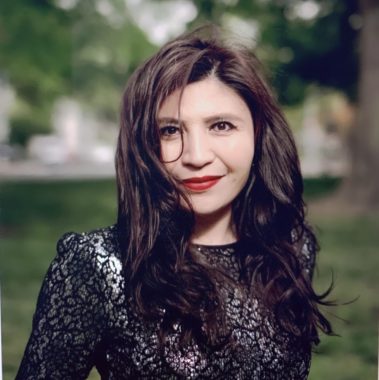
Rayhan Asat LLM ‘16
Rayhan Asat is an attorney, president of the American Turkic International Lawyers Association, and senior fellow at the Raoul Wallenberg Center for Human Rights. Rayhan specializes in anti-corruption, business, and human rights. Her work focuses on democratic leadership, labor rights, and human rights as core elements of foreign policy, and the relationship between emerging technologies and human freedom. She interfaces with civil society, governments, world leaders, businesses, and grassroots organizations to advise and address human rights concerns. She is committed to pro bono practice and helping victims of war and mass atrocities.
As an advocate and human rights lawyer, Rayhan is committed to issues concerning surveillance, business ethics, forced labor, free media, and free speech. Rayhan advised the World Bank and the Organization for Economic Cooperation and Development in designing integrity principles for the Human-Centered Business Project.
Rayhan has been featured in The New York Times, The Guardian, BBC, The Hill, CNN, Deutsche Welle, and many other media outlets. As a prominent human rights lawyer, she is a sought-after speaker at various conferences and international forums. Rayhan is also an extensively published author. In addition to legal journals, her opinions and writings have appeared in Foreign Policy, NBC News, The Hill Magazine, and other prominent publications.
A graduate of Harvard Law School, Rayhan mentors law students who take part in national and international moot court competitions. She also served as a teaching fellow at Harvard University.
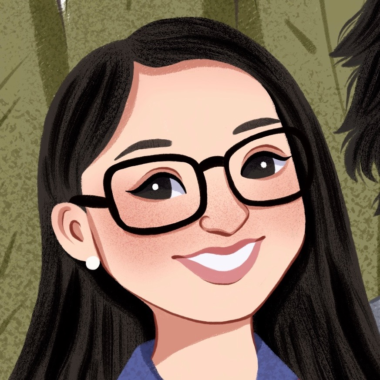
Jamie Magcale JD ‘21
Jamie Magcale is a 3L student from the Philippines and serves as Co-President of HLS Advocates for Human Rights. She graduated from the Ateneo de Manila University in 2015 with a degree in Psychology. She spent her 1L summer at the National Center for Law & Economic Justice and her 2L summer at Covington & Burling. At HLS, she is also involved with HLS TaxHelp and the Catholic Law Students Association.
This post first appeared on the HLS Advocates for Human Rights blog.
